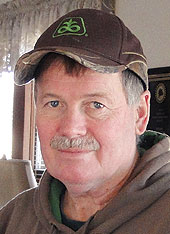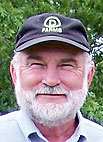
Don Crawley’s mother and father got married and settled land in 1922 outside of Maysville, Ark. Don said, “In the 1930s when I was a boy, life was milking a few cows and raising a few laying hens. Now we just do it on a bigger scale.” Don’s earliest agricultural memory is milking when he was in grade school and remembering the lack of milking machines which he believes was one of the best improvements in the industry over the years. Don also served in the military during World War II as a tail gunner and completed 47 missions over Germany. His work ethic and dedication greatly influenced his sons.
Don and son, Tim Crawley, own and rent 650 acres on which they run a dairy farm and two egg laying houses. They work closely with Tim’s older brother, Russell, while another brother, Dennis, who is a dairy nutritionist, monitors and changes the balance in their dairy feed according to availability, the needs of the herd, and the time of the year. The Crawley’s own a total mix ration wagon, which they use to custom mix their feed.
The dairy herd consists of 300 cows and 300 heifers, which are Milking Shorthorns, Jerseys, Holsteins or a Shorthorn and Holstein cross. Tim readily admits the Shorthorns are a family tradition but also are less affected by the heat and require a lower energy diet. He likes the Holsteins because they are more assessable in the market and produce a good volume of milk while the Jerseys produce a higher butterfat content and are also more heat resistant.
The herd is divided into two groups, a high group where animals stay for less than six months and produce milk before being moved to the low group when they are pregnant. Cows are milked twice a day by one man in the morning and one man in the evening at 3 a.m. and 3 p.m., with milking lasting until 8:30 or 9 o’clock. Cows and heifers are bred by AI with sires selected by proven offspring with high milk production, sound feet and legs, good udders and moderate size. Tim said, “We don’t like great big cows because they can get stuck in the free stalls.” The Crawley’s rely on the competition between visiting representatives from semen companies to help keep expenses down and semen quality high.
The Crawley’s keep all the heifer calves but raise the bull calves to 250 to 550 pounds which they sell mostly at the Decatur Livestock Auction. They cull cows when their production is low, udder health is not optimal or they don’t breed back.
A dairy herd of this size requires a significant haying and silage operation. They hay 250 acres and raise corn on 75 acres and sorghum on 80 acres. Last year they produced 20 tons per acre of corn silage, the best yield they’ve ever had, and 15 tons per acre of sorghum silage. In addition they have a 20-acre alfalfa crop in Oklahoma. Tim said, “I’d like to have more alfalfa but we don’t have a land base for it. Hopefully some land suitable for alfalfa will become available to us in the future.”
The Crawley’s believe in the EQIP program. Tim said, “If people would just admit it, some government programs help you become more efficient and keep the environment healthy as well. The Crawley’s have used the program for water tanks, fencing, settling tanks and pond waste storage as well as building a 300×100’ barn for feeding and sheltering the cows. The barn was originally built in 2001 and increased in 2006 to accommodate the entire herd. The building has 33 fans and 640 feet of sprinklers to cool the cows in the summer while they feed.
For the Crawley’s, chickens and dairy are a good partnership. Tim said, “Dairy provides a regular income and so does having layer houses.”
The Crawley farm has won Progressive Breeder with Milking Shorthorns a number of times as well as numerous individual classes. Last year Tim’s daughter Brittany exhibited the Junior All American Aged Milking Shorthorn Cow.
Because of the size of the operation, the Crawley’s have six full-time employees and four part-time employees. One of the milking employees has been with them for over 8 years. Tim said, “I love this business but wish I had more time because I’m almost always managing and solving problems.”







